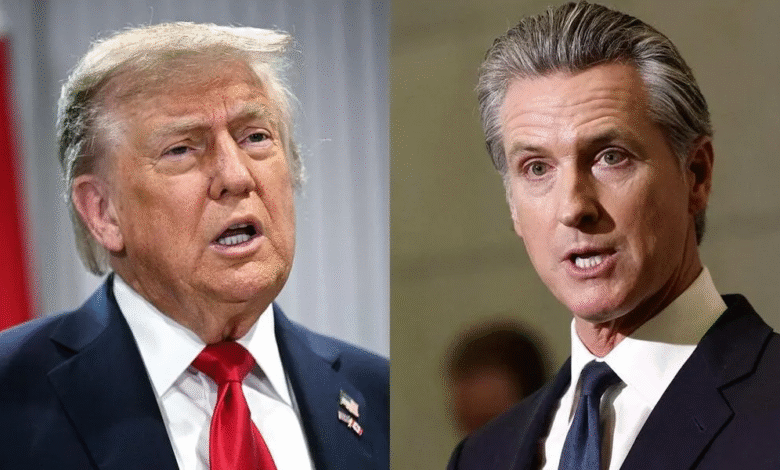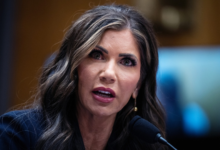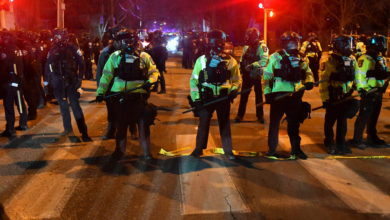‘No-holds-barred fight’: California’s governor takes off his gloves to punch back at Trump
Gavin Newsom has trolled the president mercilessly online, but he’s counting on his redistricting scheme to reclaim the House for Democrats – and boost his presidential ambitions

In the first weeks of Donald Trump’s second term, Gavin Newsom bet that peace would be the best solution: a warm welcome on the tarmac from Air Force One, a visit to the Oval Office, and a podcast session with leading figures in the MAGA movement. But then Trump arrived in California, and the governor abandoned the pleasantries.
With a flurry of big-cap social media posts, a proposed counter-redistricting, and a series of lawsuits against the new administration, Newsom isn’t just confronting Trump. He’s rethinking his tactics: fight, fight, fight.
“We have to wake up and get rid of the illusion that we’re Democrats,” Newsom said in a podcast last week. “I’m tired of being weak. I’m tired of being weak. I’m tired of being irrelevant. It’s not cool to say it—it’s time to act.”
Newsom burst onto the national scene as a reshaped political figure, ready to wield his power as brutally as the other side. On Thursday, he signed a redistricting bill creating a special election requiring voters to temporarily redraw the state’s congressional boundaries, granting Democrats up to five additional seats in the U.S. House of Representatives in next year’s midterm elections.
The ballot measure is a direct attempt to “neutralize” partisan redistricting in Texas, designed at Trump’s behest to protect the fragile Republican majority in the House. At the bill signing ceremony Thursday, Newsom cited the president’s assertion that he “deserved” five additional congressional seats in the Lone Star State: “That should strike fear into your heart.”
The California referendum now transforms a non-election-year election into a high-stakes national showdown that could determine control of Congress and set the stage for 2028. For Newsom, who recently completed his term and is widely considered a presidential contender, the success—or failure—of this 11-week race could have profound consequences for his political future.
The November by-election offers voters in deeply Republican California an opportunity to respond to Trump, who has steadily tormented the state since returning to the White House. But by temporarily bypassing the California Independent Redistricting Commission—a longtime source of pride for the Golden State—Democrats are being asked to “compromise their own values,” said Kim Nalder, a political science professor at California State University, Sacramento. “The idea that ‘they go down, we go up’ has been a model for many Democrats,” she added. “One risk is that the Democratic Party—and Newsom himself—will be caught up in this bitter, uncontrolled fight, instead of having a clear set of policy principles to uphold no matter what.”
Uncertainty remains over Californians’ decision. A Berkeley Institute of Governmental poll released Friday showed that 48% of registered voters in the state support Newsom’s redistricting plan, compared to 32% who oppose it. Another 20% are undecided, giving each campaign an opportunity to make its case.
“If Proposition 50 passes and Californians are able to win seats in the House of Representatives, and he is partly, or even entirely, responsible for winning the House next year, he will be nothing short of a hero,” said Bill Whalen, a fellow at the Hoover Institution and speechwriter for Pete Wilson, the former Republican governor of California.
Even if the initiative fails in November, Whalen is confident that Newsom will remain a champion. An asset. He said, “He’s still respected among Democrats for his honorable fight. I don’t understand why he failed.”
The bitter political war between the president and the California governor erupted early this summer when Trump commandeered the California National Guard and deployed U.S. Marines to Los Angeles, over Newsom’s objections, to quell protests against a federal immigration crackdown. The raids continue, and Trump has targeted the state in several other ways: by attempting to deprive the University of California, Los Angeles, of federal funding and by imposing tariffs that threaten California’s economy, the fourth-largest in the world.
Newsom has asserted that Trump poses a threat not only to his state, but to the entire 249-year-old American project. While his approach may offend well-intentioned Democrats, he says the moment demands it.
“Yes, things have changed. The facts have changed. We have to change,” he said recently in an interview with the local press.
In recent weeks, as Newsom escalated his attacks on Trump, calling him “weak” and a “failed leader,” his social media team has lashed out at the president online, unleashing a wave of delirious nonsense, AI-generated political fan art, and biting satire, some signed with the governor’s initials, GCN, intended to mimic the president’s chaotic posting style.

Newsom claims he’s simply showing off. “If you have objections to what I post, it’s only natural that you’d be concerned about what he posts as president,” he told reporters last week.
These posts went viral, garnering millions of views, thousands of comments, and significant engagement. They’ve also attracted the attention of the right. Fox News anchors Kid Rock, J.D. Vance, and even Trump himself fell for it, triggering what the governor’s team gleefully called “MAGA meltdowns.”
“JESSE WATTERS KEPT CALLING ME ‘DADDY’ (VERY WEIRD, NOT INTERESTED, BUT THANK YOU!)” his office clapped back, in an 188-word tweet about Fox News’s breathless coverage of Newsom’s furious posting streak.
Vance told Fox News anchor Laura Ingraham, “Gavin Newsom can mimic Donald Trump all he wants, but they will lose if they don’t adopt better policies that actually serve the American people.”
Trump, meanwhile, weighed in on his Truth Social platform, promising to save “the once great state of California” from “sleaze.”
“Did he provoke you?” Newsom replied with a wink.
The Berkeley poll indicates that California voters support his effective strategy with the president by a margin of nearly two to one, with only 29% preferring a more collaborative approach. This tough stance resonated favorably with younger voters: 71% of Californians under 30 expressed support.
In a series of media appearances last week, Newsom intensified his rhetoric.
“We’re fighting fire with fire,” he said on “The Siren” podcast. “And we’re going to beat these bastards.”
The response was telling: no Democratic ethos, no rebuke from party leaders, and no pressure for Newsom to apologize. Instead, his team promoted the interview to his legions of new followers, and his supporters responded by sharing AI-generated images of the governor as a superhero.
“People are just not used to seeing these kinds of exaggerated, unverified messages in polls from Democrats,” said Olivia Juliana, a 22-year-old Texas Democratic activist and social media influencer who interviewed Newsom for this episode. “He’s real, honest, authentic, and he shows that he’s a fighter.”
As Democrats prepare to lose up to five U.S. House seats in her state under a redistricting plan passed by the Texas legislature on Saturday, Juliana said voters worried about Trump’s blatant power grab are desperate for leaders who offer more than just fighting words.







